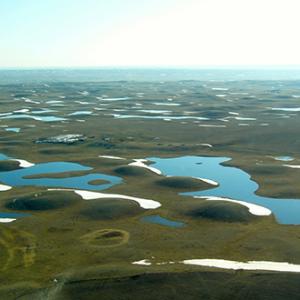NC CASC Webinar Series: "Integrating Climate Change Projections with Breeding Waterfowl Habitat Models"
Date
Please join us for the NC CASC webinar on Thursday, June 10, 2021, 11a -12p MDT:
Integrating Climate Change Projections with Breeding Waterfowl Habitat Models
Presented by: Owen McKenna, Research Ecologist, USGS NPWRC; Ned Wright, Wildlife Biologist, USFWS HAPET
Registration link: Register in advance for this meeting: https://cuboulder.zoom.us/meeting/register/tJcucu-prz4jH92qPevpKzJQVBRzU_EQTkr-
After registering, you will receive a confirmation email containing information about joining the meeting.
Abstract:
The Prairie Pothole Region (PPR) is recognized as one of the most productive areas for waterfowl in North America and is used by an estimated 50–80 % of the continent’s breeding duck population. The ongoing acquisition program of the U.S. Fish and Wildlife Service National Wildlife Refuge System has conserved approximately 1.3 million hectares of critical breeding-waterfowl habitat. A major assumption inherent to the current conservation approach is that past distributions of waterfowl habitat and populations are relatively representative of future distributions. Our goal with this interagency collaboration is to co-produce useable information to better plan for future impacts of climate change on the wetland habitat for breeding waterfowl pairs in the U.S. Prairie Pothole Region. We are using a mechanistic hydrology model in combination with multi-decadal monitoring data and predictive breeding waterfowl pair statistical models to simulate wetland-waterfowl responses under different climate futures.
About the speakers:
Dr. Owen McKenna is a Research Ecologist at Northern Prairie Wildlife Research Center in Jamestown, ND. Dr. McKenna holds a Ph.D. in Environmental Life Sciences at Arizona State University. His research is focused on studying how changes in climate and land use can alter the hydrology and geochemistry of prairie-pothole wetlands. Dr. McKenna has explored a regional climate-induced ecohydrological state shift in wetland ecosystems through analysis of long-term data. He also helped in development and application of the Pothole Hydrology Linked Systems Simulator (PHyLiSS), which is an integrated hydro-geochemical model for prairie pothole wetlands. Dr. McKenna is currently using PHyLiSS to assist land managers in estimating the future impacts of climate and land-use change on critical migratory waterfowl habitat.
Ned Wright is a Wildlife Biologist with the U.S. Fish and Wildlife Service Habitat and Population Evaluation Team (HAPET) in Bismarck, ND. Mr. Wright holds a B.S. in Conservation Biology from University of Wisconsin Madison. He oversees the coordination of long-term study of waterfowl populations in the Prairie Pothole Region of the United States. This survey is recognized as the primary method to monitor the abundance and distribution of breeding waterfowl by the Prairie Pothole Joint Venture.
Past NC CASC Webinar Recordings: https://nccasc.colorado.edu/webinars
Dates for 2021 NC CASC webinars:
July 8, 2021, 11a-12p MDT
August 12, 2021, 11a-12p MDT
September 9, 2021, 11a-12p MDT
October 14, 2021, 11a-12p MDT
November 11, 2021, 11a-12p MST
December 9, 2021, 11a-12p MST


